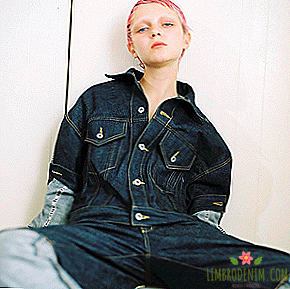DOCKER: How we made a festival of rare documentary films
IN THE RUBRIC "COMMUNICATIONS" WE TELL ABOUT GIRLS, who came up with a common cause and achieved success in it. But at the same time we expose the myth that women are not capable of friendly feelings, and can only aggressively compete. The International Documentary Film Festival "Doker" will be held in five cities of Russia in early April. The program "DOCAER" is traditionally built around author works - and this is almost an exceptional chance to see films that most likely cannot be seen anywhere else (not only on the big screen, but also on the Internet). On how to grow a representative international film festival, how it is being prepared and how difficult it was for the work of the new laws adopted at the suggestion of the Ministry of Culture last year, we talked with the founding members of DOCA Irina Shatalova and Nastya Tarasova.

Dmitry Kurkin
About how appeared "DOCKER"
Irina Shatalova: I graduated from the VGIK Faculty of Photography, Vadim Yusov workshop in 2007, since then I have been working in documentary, occasionally switching to fiction or, rather, hybrid cinema. I consider the camera operator as the main profession, despite the fact that DOCER makes serious changes in the life and professional schedule - the festival even influenced the acceptance of proposals for filming.
Nastya Tarasova: I am a director, graduated from VGIK, I have been involved in documentary films for more than ten years - at various studios and in-house production. She made films not only in Russia, but also in Poland, Italy and the USA.
Irina Shatalova: We decided to make the festival twelve years ago, when we first visited a similar foreign event as authors. It was the German DOK Leipzig, whose history spans more than half a century, that is, it attracted the third generation of citizens. But then it was not this that shocked, but the program - a documentary film, which we had never seen before, despite the five-year study at VGIK. It was there that my total bottomless isolation became obvious to me, the isolation of us, documentary filmmakers, and Russian film critics, and even more so the audience from the most important cultural processes, including the author's documentary film.
After this experience, another five years passed before we ourselves began to organize film screenings. From the very beginning we saw the festival exactly the way it became. But we were not event managers and were aware that if we did not prepare the ground and gain experience, we wouldn’t draw a serious level. Therefore, in 2011, they first opened the DOCER film screening project - it was a non-profit, even charitable activity in some ways, because we invested endlessly with our time, effort, and money. In that format, the project existed for four years.
We regularly, it happened that with the frequency of once a week, we organized shows and master classes, we were not tied to one place, we were ready to embark on any adventure, just to promote documentary films. During this time, the team has grown and gained experience, so in the summer of 2014 we felt ready for more - and announced the birth of the film festival. The main thing is that it is clear to ourselves why we are now at this very point. We are not trying to artificially inflate something from ourselves, no one swells money into us, no one stands behind us. We are where we are. And the philosophy here is very simple: "Do what you must, and come what may."
How films are selected
Nastya Tarasova: The job of selecting films does not end there. Now in April there will be a festival, and from June we will start accepting applications for the next year again. Most likely, from mid-summer I will begin to consider the general flow, and it will last until January, inclusive. Applications come a lot, more than a thousand. There are a lot of “rubbish” among them - non-professional works, concocted by amateurs, and projects especially telematics, - therefore, you have to carefully divide everything into plastic, paper and precious metal. However, in such random applications there are also very interesting films of either independent directors or debutants, so I watch absolutely everything that comes. In parallel, a separate stream is working with distributors - there are companies with which our tastes coincide.
It is no longer necessary to travel all year round through festivals, most new works can be seen remotely. But our team traditionally leaves for a number of key events in the fall, for example, in the Czech Republic - in the city of Jihlava, where the largest festival of author's dock from Central and Eastern Europe is held, or DOK Leipzig, one of the oldest festivals in Europe. We have full mutual understanding with the organizers of these events since the time when we ourselves participated there. In addition to the films that we do not forget to grab from there, we still detect changes in the atmosphere of film screenings from the point of view of the organizers. World festivals are changing, and we also want to change. It is important for us to be inspired by the experiences of other people.
After processing all applications, searching for films on film markets and distributors, we form special festival programs. In addition, I compile long lists of full-length and short-length contests. By the winter, I already connect a commission, which, by selecting the short-list, helps to make sure of the interestingness and importance of the display of this or that work. It is my responsibility to assure everyone of the importance of the find, on Irina - to make the find become prey.
Irina Shatalova: If the film is difficult to bring or not negotiate with the copyright holder, and you understand that without this work the festival will be different, the surest way is an open dialogue with the author, best of all, directly the director. When the author understands the importance of his film for the festival, he is ready to help and come, and in general is ready for many things.
Last year, the "Docker" was opened by the Polish film "Beyond the Limit" by Martha Prus about the Olympic champion in rhythmic gymnastics Margarita Mamun. I knew that such a film was being prepared, a year before its premiere at the IDFA Film Festival in Amsterdam, and I was closely watching the news. As soon as I realized that the tape was ready, I immediately requested viewing. On the same day, together with Nastya, we watched a movie, then transferred to the other selectors and immediately realized that he should open the festival. However, it took four months of persuasion and negotiations to make this happen, not only with the producers, but also with one of the heroines of the film Irina Viner, and with the Russian Rhythmic Gymnastics Federation, lawyers, and a bunch of people whose existence you don’t even suspect. . On this way, many times one could give up and choose some less problematic film. But I clearly understood my motivation and knew that it was driven by director Martha Prus, so everything worked out.
About problems and festival laws
Irina Shatalova: The main problem is insufficient budget for our requests and endless attempts to find it in conditions of total independence. The fact is that the presence of authors at shows and their discussions with the audience is fundamentally for us; we consider this part of the event to be meaningful. Therefore, our main expenses are the delivery of authors from different parts of the world to Moscow.
As for the new laws on film festivals, this is just a bureaucratization of the processes. Judging by the news from the Ministry of Culture, the majority of Russian festivals, regardless of political views and orientation, are included in the official list and by law can show films without rental IDs. That is, no one at the state level introduced any prohibitions, but on the other hand, they just counted and taught everyone how to bind documents just in case.
About favorite movies and sensations
IRINA SHATALOVA: It is important for me to have a sense of awareness, acceptance of oneself and the world in a new way, a naive feeling of delight and simultaneous wisdom, which arose twelve years ago in a dark cinema hall while watching a documentary on a big screen. If I felt it, it means that someone else will certainly feel it. As experience shows, this is such an acquisition for life, it does not fade away.
Nastya Tarasov: When you make a program, all the films from it are your favorite and important ones. But at a distance, over time, I realize that some films are remembered better - perhaps because of the impressions that you experience while watching them at the festival, along with the audience, catching the emotional reaction of the audience.
For example, Return to Yourself, a film about a boy who travels to Tibet to begin a monastic life — a powerful emotional movie about growing up and breaking up. It received a Grand Prix, and this is the rare case when the jury's opinion coincided with the opinion of the audience. We showed it once, second and third, because word of mouth couldn't calm down and the viewer would go and walk. People were crying, leaving the session. There was also “Makala”, a terrific example of a very humane art-house: camera work, direction, hero, place and, as in truly outstanding documentary, the opportunity to fall into another reality without words - the reality of a person who carries coal to sell on itself a huge burden like an ant.
“Baby Given” again was remembered not just as a film, but as an event: about eight hundred children and parents left the hall, shining with happiness. Then we were asked how to release this "documentary" Avatar "" in the rental. As a program director with ambitions, it is always pleasant for me to open debuts, which then go to festivals and collect prizes. For example, the Chinese film "Harvesters": I was not sure that the jury would understand him - not like the audience. He was shot by a nugget who never studied at all, but somewhere resembled courses. This is an autobiographical film about the situation of a poor family that is starving, trying to find money and survive. It was filmed by family (!) Frames, and everything was transmitted in these frames.
Cover: thenatchdl - stock.adobe.com





